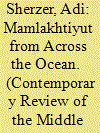| Srl | Item |
| 1 |
ID:
169981


|
|
|
|
|
| Summary/Abstract |
The concept of Mamlakhtiyut, defined by Bareli and Kedar as the Israeli version of republicanism, has shaped Israeli political system and civil culture from the 1950s onward. This article examines how this inter-Israeli concept affected David Ben-Gurion’s inter-Jewish policy toward the Jews of the Diaspora during the constructive era of the first year of statehood. The discussion focuses on the journey of Ben-Gurion to the USA during the spring of 1951 and the launching of the Bonds campaign as an alternative Israeli fundraising tool. The study of the journey’s context and a deep analysis of Ben-Gurion’s speeches during the journey demonstrate the importance of the Mamlakhti approach in the setting of Israel–Diaspora relations. I argue that the Mamlakhti-republican discourse was needed by both sides to deepen the relationship during the 1950s, point its deep influence on both policy and discourse, and suggest that today too it may foster the discourse and reframe some of the fundamental subjects that divide Israel from the Diaspora.
|
|
|
|
|
|
|
|
|
|
|
|
|
|
|
|
| 2 |
ID:
169986


|
|
|
|
|
| Summary/Abstract |
This article focuses on the immediate repercussions of a reconstituted Jewish State after “2,000 years” on its relations with Diaspora Jewry and its diplomatic relations epitomized by American and Anglo Jewry. The Jewish Agency and Zionist organizations, once effective and indispensable former “retailers” were inexorably and painfully usurped by the new “wholesaler”, the Government of Israel and its diplomats who now appealed directly to all willing to contribute to strengthening Israel, irrespective of their past or present affiliations with the Zionist movement. Israeli diplomats viewed the Zionist organizations as the board of a company, which had been nationalized, had much goodwill, an immense pool of experience, some capital, but no clear idea about what to do with themselves. The path to reach a modus vivendi on delegating and authorizing responsibilities on public relations and Israel advocacy was acrimonious.
|
|
|
|
|
|
|
|
|
|
|
|
|
|
|
|